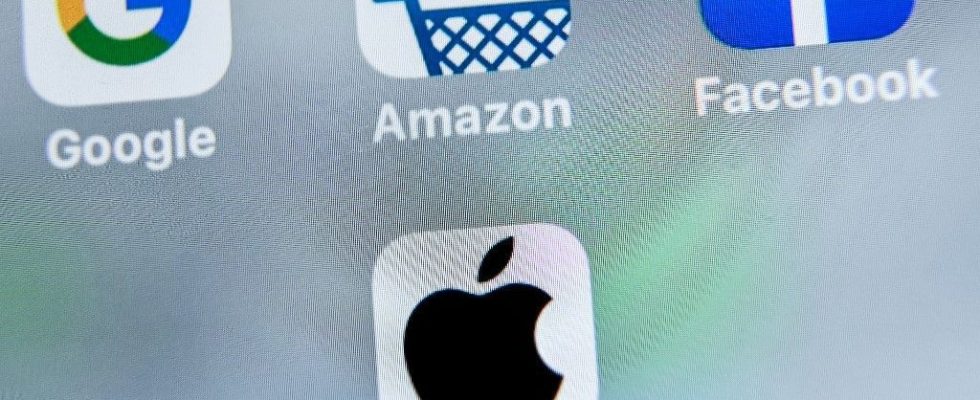The European Union is going on the offensive this Friday, August 25 against the excesses of the internet giants: the DSA (Digital Services Act) will force major platforms, such as Google, Facebook, X (ex-Twitter) or TikTok, to act more against illegal content, under penalty of heavy fines.
The principle of the new European regulation sounds like a slogan: what is illegal offline must also be illegal online – which, all experts point out, is not so simple. A delicate balance must be found between freedom of expression, which is preponderant, and the fight against abuses that threaten fundamental rights or democracy (disruption of elections, disinformation, protection of minors, etc.).
How to achieve it? The DSA targets platforms and not users: a series of obligations will be imposed on Friday on the 19 largest social networks, marketplaces and search engines (Apple, Google, Microsoft, YouTube, Amazon, Facebook, LinkedIn, Wikipedia , TikTok, Snapchat, Instagram, X, Alibaba or Booking).
As before, the platforms are neither legally responsible for the content they host nor required to identify it beforehand. But the EU hopes to push them to install an effective system of control, after ten years of increasing online violence. Among other things, they will have to offer Internet users a tool to easily report “illegal” content (defined by national legislation or other European texts), then remove it quickly. “Trusted flaggers” in each country (such as the Pharos government site in France) will have their alerts processed as a priority. Merchant sites must be able to trace sellers, to reduce fraud.
Their algorithms will also be under surveillance: they will have to explain how their recommendation systems work and offer alternatives without personalization. On the advertising side, the DSA prohibits targeting minors or ads based on sensitive data (religion, sexual orientation, etc.).
Compliance with the rules will be monitored by independent audits, under the watchful eye of Brussels. Violations will result in fines of up to 6% of worldwide turnover. Ultimate threat, repeat offenders could be banned.
“Brussels effect”
“The reporting mechanism and the use of trusted flaggers is a game-changer, as well as the audits controlled by Brussels”, judge Eric Le Quellenec, lawyer at Simmons and Simmons. This control is supervised by a collegiate body of the 27, “in order to prevent countries from applying too broad a definition of illegal content, such as Poland or Hungary”, he adds. “This will partially reduce online anonymity: we will track sellers and those who massively publish illegal content”.
“Will the DSA be effective? We will see with use. But it is an innovative system because it establishes a permanent dialogue between actors, regulators and users. There will also be a ‘Brussels effect’ beyond the EU,” notes Marc Mossé, lawyer at August Debouzy.
The Commission will however have to acquire adequate means, given the size of the legal services of Gafam, underlines the economist Joëlle Toledano, member of the National Digital Council. Finally, it will be necessary to ensure that fundamental freedoms are preserved: the experts underline the volte-face of the European Commissioner Thierry Breton who, at the beginning of July, after the riots in France, had affirmed that the DSA would make it possible to suspend a social network if it did not delete “immediately” “calls for revolt”. The echo of a wish by French President Emmanuel Macron to be able to “cut” social networks.
Platforms bend
Three weeks later, after an open letter from 65 organizations for the defense of freedom of expression, Thierry Breton went back on his point by declaring that only a judge could take such a measure. “We saw him backpedaling. We must correct the excesses but without falling into the opposite excess”, notes Marc Mossé. “But without media education for young people, everything will be a bit pointless.” In recent weeks, most major platforms, such as Google and Microsoft, have announced compliance efforts.
Meta (Facebook) says it has recruited 1,000 people and believes that the DSA is “a major event for all technology companies operating in the EU and will have a significant impact on the experience of Europeans”. TikTok has publicly listed the measures adopted, Apple explains that it is in the process of putting them in place and Elon Musk has promised that X (ex-Twitter) will respect the DSA.
Amazon has filed an appeal against its presence in the list (just like the Zalando shopping site) but indicates that it invests a lot in reporting illegal content and intends to comply with the regulations if it is dismissed. “The DSA marks the end of the internet age where platforms decided on their own what was best for all of us and were ‘too big to care’ about their effects on society,” an EU official concludes.
